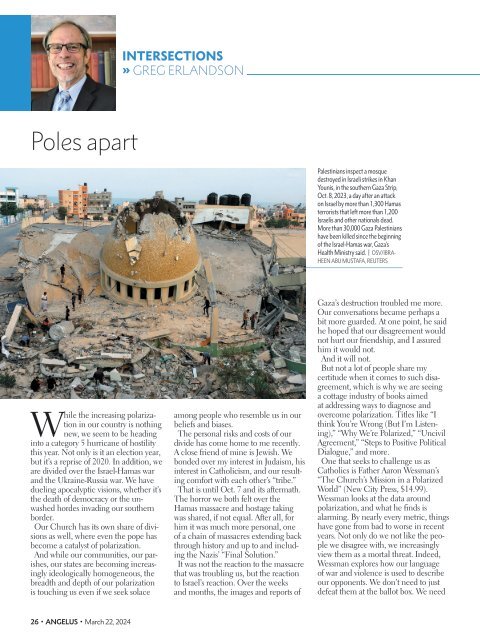Angelus News | March 22, 2024 | Vol. 9 No. 6
On the cover: To cap off a nearly five-decades-long career working in Church communications, Francis X. Maier had an ambitious book idea: a ‘snapshot’ of the Church in America at this time in history that captured both its strengths and its sicknesses. On Page 10, Maier shares what he took away from hearing more than 100 “confessions”’ with American Catholic leaders for the project. On Page 20, John L. Allen Jr. offers his own diagnosis of the uneasy relationship between U.S. Catholics and Rome during the Pope Francis pontificate.
On the cover: To cap off a nearly five-decades-long career working in Church communications, Francis X. Maier had an ambitious book idea: a ‘snapshot’ of the Church in America at this time in history that captured both its strengths and its sicknesses. On Page 10, Maier shares what he took away from hearing more than 100 “confessions”’ with American Catholic leaders for the project. On Page 20, John L. Allen Jr. offers his own diagnosis of the uneasy relationship between U.S. Catholics and Rome during the Pope Francis pontificate.
Create successful ePaper yourself
Turn your PDF publications into a flip-book with our unique Google optimized e-Paper software.
INTERSECTIONS<br />
GREG ERLANDSON<br />
Poles apart<br />
Palestinians inspect a mosque<br />
destroyed in Israeli strikes in Khan<br />
Younis, in the southern Gaza Strip,<br />
Oct. 8, 2023, a day after an attack<br />
on Israel by more than 1,300 Hamas<br />
terrorists that left more than 1,200<br />
Israelis and other nationals dead.<br />
More than 30,000 Gaza Palestinians<br />
have been killed since the beginning<br />
of the Israel-Hamas war, Gaza’s<br />
Health Ministry said. | OSV/IBRA-<br />
HEEN ABU MUSTAFA, REUTERS<br />
While the increasing polarization<br />
in our country is nothing<br />
new, we seem to be heading<br />
into a category 5 hurricane of hostility<br />
this year. <strong>No</strong>t only is it an election year,<br />
but it’s a reprise of 2020. In addition, we<br />
are divided over the Israel-Hamas war<br />
and the Ukraine-Russia war. We have<br />
dueling apocalyptic visions, whether it’s<br />
the death of democracy or the unwashed<br />
hordes invading our southern<br />
border.<br />
Our Church has its own share of divisions<br />
as well, where even the pope has<br />
become a catalyst of polarization.<br />
And while our communities, our parishes,<br />
our states are becoming increasingly<br />
ideologically homogeneous, the<br />
breadth and depth of our polarization<br />
is touching us even if we seek solace<br />
among people who resemble us in our<br />
beliefs and biases.<br />
The personal risks and costs of our<br />
divide has come home to me recently.<br />
A close friend of mine is Jewish. We<br />
bonded over my interest in Judaism, his<br />
interest in Catholicism, and our resulting<br />
comfort with each other’s “tribe.”<br />
That is until Oct. 7 and its aftermath.<br />
The horror we both felt over the<br />
Hamas massacre and hostage taking<br />
was shared, if not equal. After all, for<br />
him it was much more personal, one<br />
of a chain of massacres extending back<br />
through history and up to and including<br />
the Nazis’ “Final Solution.”<br />
It was not the reaction to the massacre<br />
that was troubling us, but the reaction<br />
to Israel’s reaction. Over the weeks<br />
and months, the images and reports of<br />
Gaza’s destruction troubled me more.<br />
Our conversations became perhaps a<br />
bit more guarded. At one point, he said<br />
he hoped that our disagreement would<br />
not hurt our friendship, and I assured<br />
him it would not.<br />
And it will not.<br />
But not a lot of people share my<br />
certitude when it comes to such disagreement,<br />
which is why we are seeing<br />
a cottage industry of books aimed<br />
at addressing ways to diagnose and<br />
overcome polarization. Titles like “I<br />
think You’re Wrong (But I’m Listening),”<br />
“Why We’re Polarized,” “Uncivil<br />
Agreement,” “Steps to Positive Political<br />
Dialogue,” and more.<br />
One that seeks to challenge us as<br />
Catholics is Father Aaron Wessman’s<br />
“The Church’s Mission in a Polarized<br />
World” (New City Press, $14.99).<br />
Wessman looks at the data around<br />
polarization, and what he finds is<br />
alarming. By nearly every metric, things<br />
have gone from bad to worse in recent<br />
years. <strong>No</strong>t only do we not like the people<br />
we disagree with, we increasingly<br />
view them as a mortal threat. Indeed,<br />
Wessman explores how our language<br />
of war and violence is used to describe<br />
our opponents. We don’t need to just<br />
defeat them at the ballot box. We need<br />
26 • ANGELUS • <strong>March</strong> <strong>22</strong>, <strong>2024</strong>

















